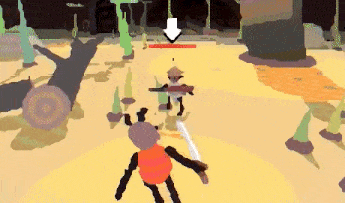Sokpop Collective: The Interview
Sokpop, I would argue, are one of the most interesting development outfits in the indie space. Not only is their catalogue of games vibrant and deliciously odd, but their approach to the business of games is also bold and refreshing, too. These are some of the topics we dig into in our interview with the lads.
Enjoy x
Talk me through the early days. How and where did the founding Sokpop members come together, and what was the first project you rallied around?
When we were still studying we were all individually doing a lot of game jams. We ended up meeting each other through game events and friends of friends. We were all interested in doing solo dev, but we were also aware of all the struggles that entailed, so that's why we ended up rallying together!
Video game boyband from the future.
When did the game-a-month mission first surface? Did the mission shape the games that you then developed, or was it more led by the number of specific game ideas/concepts that you wanted to make?
When we graduated we had to start making money. We all had a lot of experience with smaller games through game jams, so that's when we settled on our Patreon where we make a new game every month. We all make our projects individually, so each one of us needed to make a game every 2 months to reach the game-a-month as a collective!
During the first phase of Sokpop's life, how was the studio set up to support this aggressive cadence of release from a production perspective? Did the time constraint always dictate the decision making from a scoping perspective?
Many creators might recognize the need to make something different very often. I’d bet a lot of creators are familiar with this feeling of “I just want to do this and I just want to make that, but I can’t”. Time is the most valuable thing to have. Sometimes when you release a game, you think to yourself, I should change that, or I could have done better. The two month production cycle allowed us to have a mindset that we can just release another game after this one.
On the business model side of things, how and when did Patreon come into the picture? Sokpop are somewhat pioneers of this approach (at least with the mission framing it) -- are you surprised more independent studios haven't gone down this route?
We had this idea to do a games subscription for a long time and during that time, Patreon became the solution to the problem. It’s simple and it works. It became this sort of a magazine except you get to play games. It gave us the opportunity to make cool prototypes and try some experimental ideas that we probably wouldn’t do otherwise. Itch.io also had an integration so it was easier to give access to the Patrons.
The games are also available on itch.io and Steam individually so people who aren’t subscribed to the Patreon can still buy them. Since releasing our games on Steam, it’s been a 50/50 between Steam and Patreon.
White Lavender - one of the games available in this month’s partnership with Sokpop
I'm keen to know more about how you guys approach commercial validation, if at all. Do you have any sort of process for validating which games get made and which don't, or is your philosophy more: "we have this idea, let's bring it to market and see how it does!". As somebody involved in signing and marketing of games, I'm fascinated by your process here, and the fact you're almost able to assess commercial validation IN MARKET.
We don’t really have a structured approach about commercial validation. If you don’t have any motivation or if it isn’t interesting, then it’s not fun to make the game at all. We just make games. Even if our games are good and we want them to sell well, it doesn't always happen. Sometimes, when you don't expect it at all, a game will suddenly sell well. You never really know what can happen.
With the number of games now sitting in your vast catalogue - do you have a favourite? (I understand this is like trying to pick a favourite child, sorry...)
I think we can all agree that "oh crab!" is our best game!*
*just kidding don't play it it's the only game we all made together and it's terrible
Oh Crab
More recently you've shifted to bigger games over a longer time frame -- what was the reasoning behind the shift here? Has it allowed you to developer certain types of games that previously were off limits to you?
We have our own reasons for this change, but we were also influenced by what other people and our patrons have talked to us about. There have been a lot of requests to make bigger games. A lot of our games have interesting mechanics and concepts but they weren’t polished.
One of the challenges of making smaller games is that a lot of features such as controller support, localization, menus and camera controls are set aside. If we take another six months or another year, we can continue on working on the game. Now that we have shifted to making 100 games for the rest of our lives, it helps because now it doesn’t all have to be finished today. We can take a break, and come back tomorrow, or revisit the idea in another year.
Grunn
What does the future look like for Sokpop? Any little scraps you can throw us around future projects or initiatives?
Sokpop Takeover is a way where we wanted other developers to also experiment, create interesting concepts.
Huge thanks to Sokpop for their time - you can explore more of the studio’s bold and bizarre catalogue of games here.
pantaloon.




